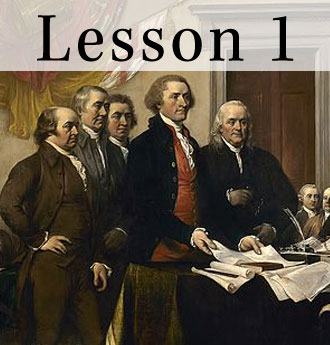Lesson 1: What Did the Founders Think about Constitutional Government?
constitutional government Limited government; the rule of law. A form of government in which a written, unwritten, or partly written constitution serves as a higher or fundamental law that everyone, including those in power, must obey. The rule of law is an essential feature of constitutional government.
democracy Literally defined as "rule of the people," democracy is a form of government in which all citizens exercise political power, either directly or through their elected representatives. See also representative democracy
forms of government (1) Aristotle's idea of three forms of government based on the number of people exercising power. Each has a "right" form and a "corrupt" form. The right form of government by a single person is a "monarchy." The right form of government by a few people is an "aristocracy." And the right form of government by many people is called "polity." (2) Types of democratic governments. For example, parliamentary systems, such as those of Britain and India; separation of powers systems, such as that of the United States; and presidential systems, such as that of France. (3) General forms of government, such as monarchies, republics, and autocracies.
limited government In natural rights philosophy, a system restricted to protecting natural rights that does not interfere with other aspects of life. More generally, limited government is constitutional government governed by the rule of law. Written or unwritten constitutions are used to empower and limit government.
mixed constitution Traditionally, constitutions that include elements of the rule of one (monarchy), the few (aristocracy or oligarchy), and the many (democracy). Aristotle first wrote of mixed constitutions, although not always about all three elements simultaneously, stating that they are more stable than simple forms. Some American writers have argued that a mixed constitution is a hallmark of a republic. The idea influenced the writing of the U.S. Constitution.
Parliament The British legislature, which consists of two houses: the House of Lords, which once represented the nobility, and the House of Commons, which formally represents the common people. Most members of the House of Lords are appointed for life by the government of the day and are not members of the hereditary aristocracy, who once dominated it.
republic According to James Madison, a form of government that derives its powers directly or indirectly from the people, is administered by officials holding power for a limited time, and incorporates representative institutions.
unwritten constitution The body of political practices developed through custom and tradition. Only three of the world's major democracies have constitutions that are not single, written documents: Britain, Israel, and New Zealand. In each of these nations, the constitution is a combination of written laws and precedents.
written constitution A written plan of government that sets forth the structures and powers of government. See constitution






